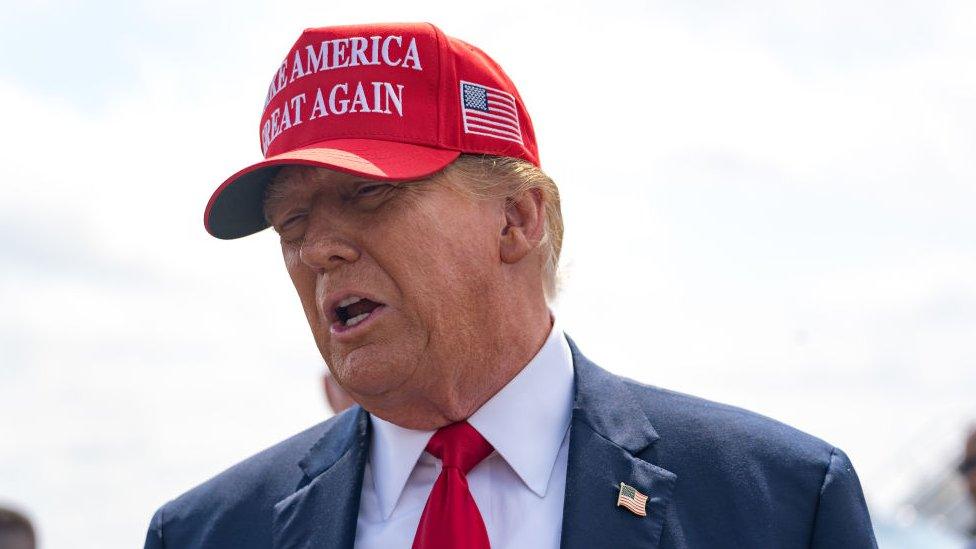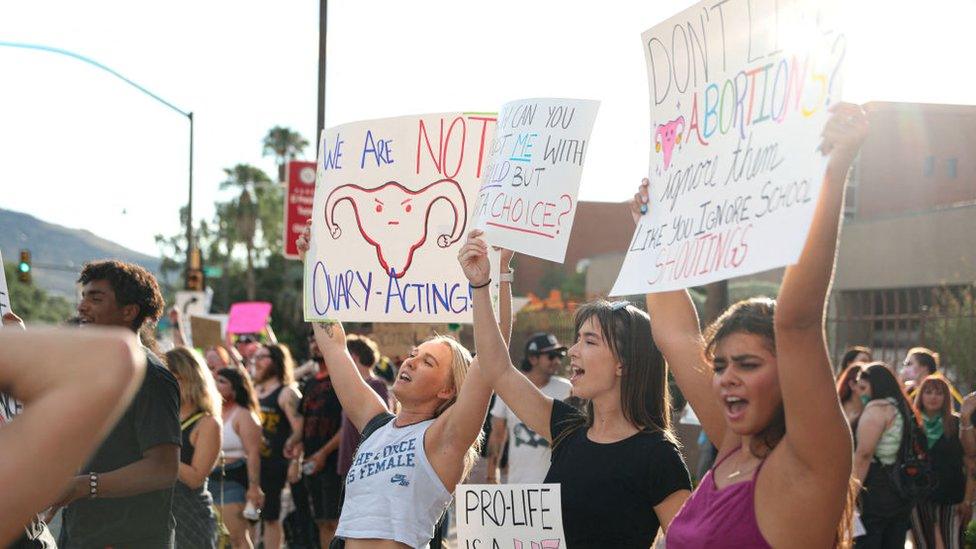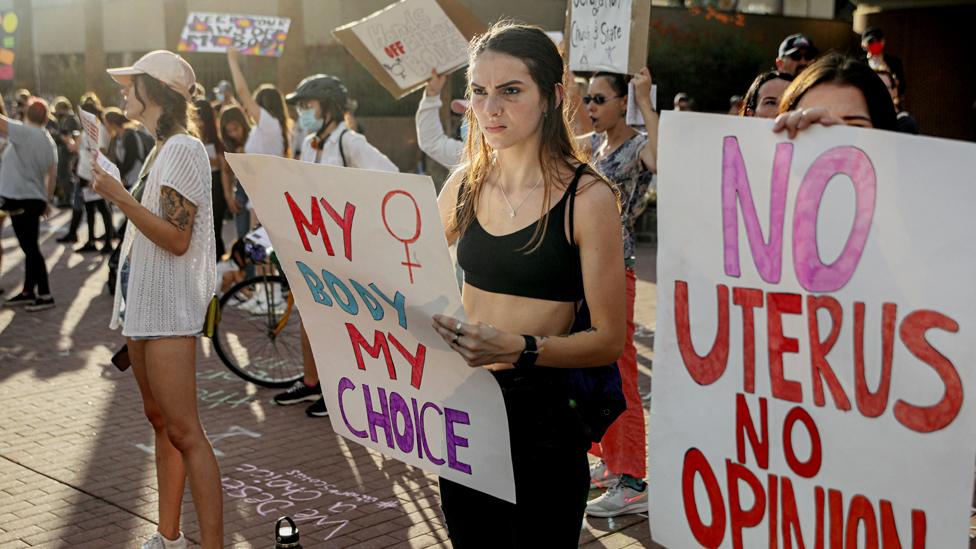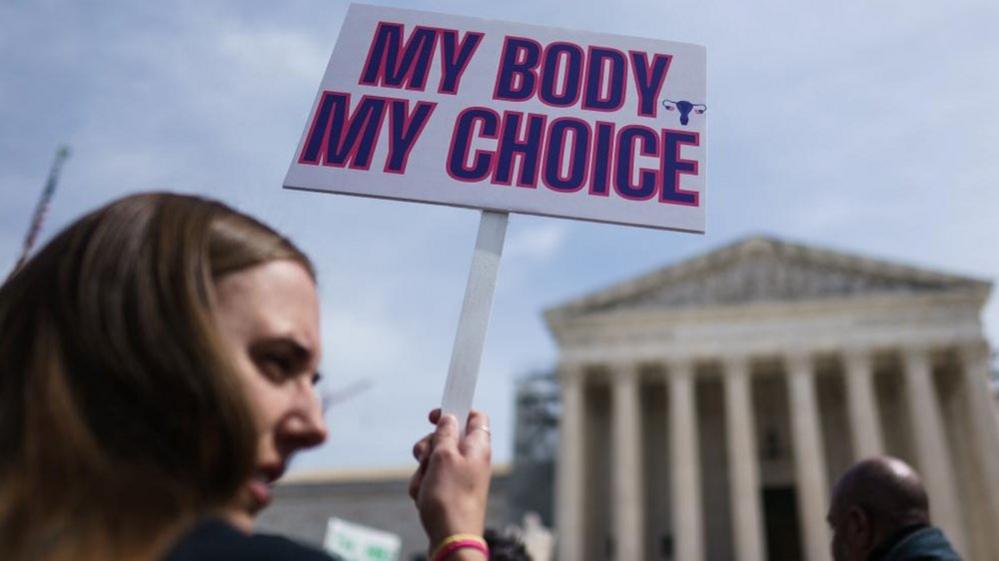Arizona pushes abortion to centre stage before US election
- Published

Donald Trump has said Arizona's Supreme Court went "too far" by paving the way for a near-total ban on abortions in the state.
The Arizona Supreme Court on Tuesday pushed the abortion issue to centre stage in a state that could be pivotal in deciding who wins November's US presidential election.
It has prompted Democrats to go on the attack, and set many Republicans scrambling to align themselves more closely with the public sentiment.
The court paved the way for a near-total ban on abortion, a law passed in 1864 when Arizona was still a US territory, to go into effect in the coming weeks if there is no further legal action. The law had been pre-empted for nearly a half-century, as a result of the 1973 US Supreme Court ruling in Roe v Wade that guaranteed a woman's right to abortion.
Two years ago, however, the US Supreme Court overturned that abortion precedent. This gave old bans like the one in Arizona - which became a state in 1912 - new life.
The Arizona court decision prompted quick condemnation from the Biden administration as well as from local Democrats and pro-choice activists.
"This ruling is a result of the extreme agenda of Republican elected officials who are committed to ripping away women's freedom," the president said in a statement provided by the White House.
While anti-abortion groups heralded the decision, many Republicans have distanced themselves from the state court action, reflecting polls that suggest a majority of the public - in the US and in Arizona - favour abortion rights and oppose strict bans on the procedure.
The party had largely opposed abortion before Roe was overturned, but is now grappling with the fallout from that decision. Kari Lake, the presumptive Republican nominee for an open Arizona Senate seat, provided a vivid illustration of the challenges and contradictions the abortion issue is presenting for conservative candidates.
In a statement released on Tuesday, the former television news presenter condemned the court ruling and said that the 1864 law, which she had previously supported, was "out of step with Arizonans". She said Arizona voters would have the chance to decide the abortion issue in the forthcoming ballot referendum - although she has said she is against its passage.
She called on the Democrat who beat her in 2022, Governor Katie Hobbs, to work with the Republican-controlled legislature to find a "common sense" solution - without spelling out what that would entail.
On Monday, former President Donald Trump released a short video detailing his own shifting position, which included leaving the ultimate decision on legality to individual states. It was a message that Ms Lake echoed.
"I wholeheartedly agree with President Trump," she said. "This is a very personal issue that should be determined by each individual state and her people."
By Wednesday, Mr Trump himself had weighed in on the Arizona ruling, saying it had gone "too far".
While the Arizona Supreme Court left the door open to further legal challenges, if the 1864 ban goes into effect it could provide a stark illustration for voters of what individual states determining abortion policy can look like.
Two weeks ago, the Florida Supreme Court ruled that the state's six-week abortion ban could go into effect. This has fuelled speculation the issue could make the large state, which has trended toward Republican of late, a key presidential battleground.
Now there's a new ground zero in the national abortion fight.
Arizona is already an electoral battleground. Joe Biden was the first Democrat in 24 years to win the state, with its 11 electoral votes, by a margin of about 10,000 votes. If he can repeat the feat there, it gives the president a path to victory even if he drops other closely contested states he won four years ago, like Wisconsin, Nevada and Georgia.
The state's Senate race, between Ms Lake and Democrat Ruben Gallego, will also help determine which party controls the upper chamber of Congress.
With the abortion-rights referendum expected to appear on the November ballot, Democrats were already hoping the issue would help drive turnout from voters more inclined to support Mr Biden and the rest of the party's slate of candidates.
Similar abortion-rights measures have passed in every state that has put them to a vote, including Republican-dominated states like Kansas, Kentucky and Ohio. Democrats have campaigned aggressively on the abortion issue, and the connection is widely considered to have helped the party post better-than-expected results in the 2022 midterm congressional elections.
In a March Fox News poll, 39% of Arizona voters said abortion would be "extremely important" in determining the presidential candidate they would support in November, and that those voters were much more likely to back Mr Biden.
With the state court's decision, the stakes have only been raised. November's ballot measure could determine whether Arizona enshrines abortion rights in its constitution, or has a virtual ban on the procedure.
It's the kind of clear choice that Democrats will relish.
Related topics
- Published11 April 2024

- Published10 April 2024

- Published26 March 2024
